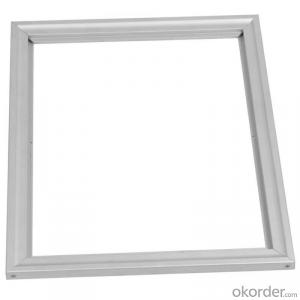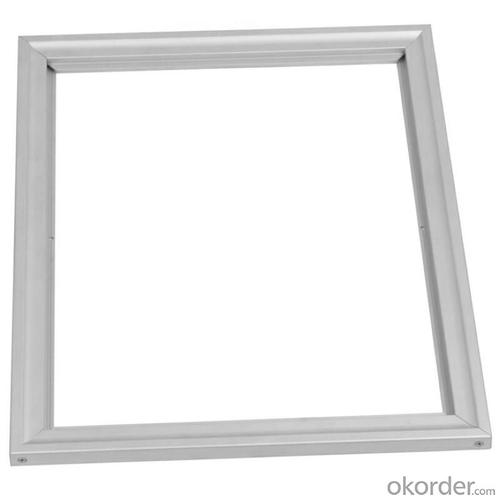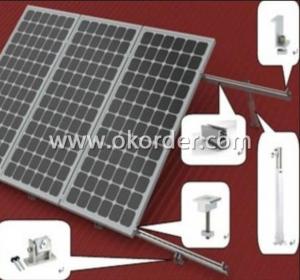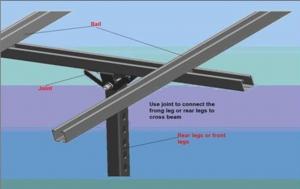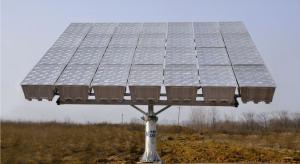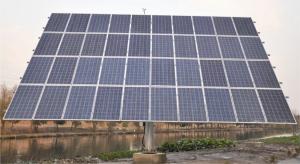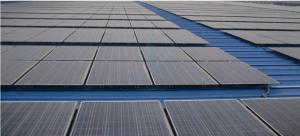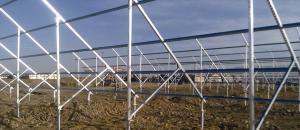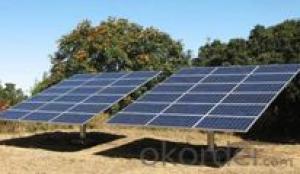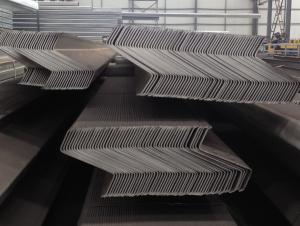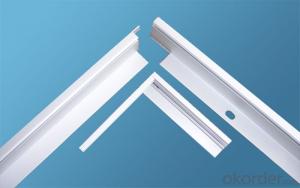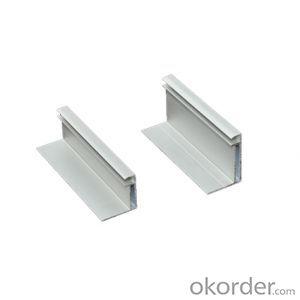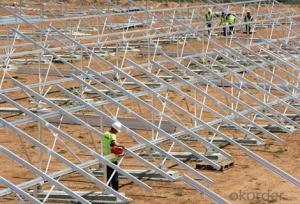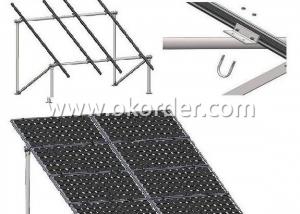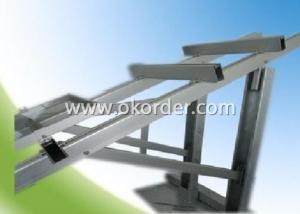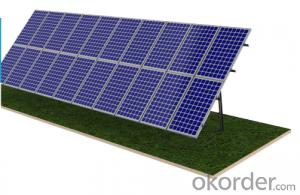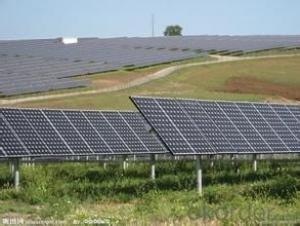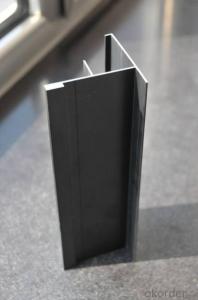K2 Solar Mounting Systems Aluminum Frame
- Loading Port:
- China Main Port
- Payment Terms:
- TT OR LC
- Min Order Qty:
- -
- Supply Capability:
- -
OKorder Service Pledge
OKorder Financial Service
You Might Also Like
A).Features:
(1).35*35 suitable for 80-180w solar modules
(2).40*35 suitable for 30-120w solar modules
(3).50*35 suitable for 160-220w solar modules
(4).Many more other sizes such as: 25*35,30*35,46*40,50*35 etc, all the sizes according to customer's requierments.
Common specifications:
620*286*30mm
754*669*30mm
824*545*30mm
1200*545*35mm
B).Two types:
(1) 90°-Angle
(2)45° -Angle
C)Suface Treatment
(1). Anodizing:(Clear,silver,golden,bronze,other muiticolar.)
(2). Electrophoresis
(3). Powder,polishing,PVDF,Sandblasting,etc
Standard: GB/75237-2004,Q/320281/PDWD-2008
Certification: ISO9001:2008
Specifications: According to your design drawings and your samples
Atavantage of our products:
1.Quality-assured products, fully accredited by ISO9001 and "National Inspection-free produt".
2.The productcts are manufactured by first-class automatized equipment and and advanced quality inspection&test facilities.Die excellent accuracy up to 0.02mm.
3.High weather resistance anti scrach anticorrosion and good wearer resistance subtle edges and eligent appearance and eazy processing and installationn high brightness and hardness.
4.Wide variety of styles and sizes suitable for any tastes and budgets
- Q: Can a solar mounting system be used with solar-powered motorcycles?
- Yes, a solar mounting system can be used with solar-powered motorcycles. These mounting systems are designed to securely hold solar panels and can be adapted to fit various surfaces, including motorcycles. By installing a solar mounting system on a motorcycle, solar panels can be attached, allowing them to generate electricity to power the motorcycle's battery or other electrical components. This helps to increase the range and sustainability of solar-powered motorcycles.
- Q: Can solar mounting systems be installed on buildings with limited roof load capacity?
- Yes, solar mounting systems can be installed on buildings with limited roof load capacity. There are various lightweight and low-profile options available in the market that are specifically designed for such buildings. These mounting systems distribute the weight of the solar panels evenly, minimizing the stress on the roof structure. Prior to installation, it is recommended to consult with a professional engineer or solar installer to assess the roof's load capacity and determine the best mounting system suitable for the specific building.
- Q: Can a solar mounting system be used on flat ground surfaces?
- Yes, a solar mounting system can be used on flat ground surfaces. In fact, flat ground surfaces are often ideal for installing solar panels as they provide a stable and level base for the system. Additionally, flat ground allows for easier and more efficient installation and maintenance of the solar panels.
- Q: Can a solar mounting system be used with a flat roof with gravel?
- Yes, a solar mounting system can be used with a flat roof that has gravel. However, certain precautions and modifications may need to be taken into consideration to ensure the stability and integrity of the system. The gravel on the roof may need to be removed or leveled to provide a flat and even surface for mounting. Additionally, suitable ballast or anchoring methods may be required to secure the solar panels in place. It is advisable to consult with a professional installer or engineer to determine the most appropriate and safe approach for installing a solar mounting system on a flat roof with gravel.
- Q: Can a solar mounting system be used with solar concentrators?
- Yes, a solar mounting system can be used with solar concentrators. Solar concentrators are designed to concentrate sunlight onto a small area, increasing the intensity of the sunlight and thereby increasing the energy output. A mounting system is necessary to securely and stably hold the concentrators in place, ensuring optimal performance and efficiency.
- Q: What is the expected increase in energy efficiency with a solar mounting system?
- The expected increase in energy efficiency with a solar mounting system can vary depending on various factors such as the type of mounting system used, the orientation and tilt angle of the solar panels, and the location's climate and sunlight conditions. However, on average, a well-designed solar mounting system can increase energy efficiency by around 10-20% compared to solar panels installed without a mounting system.
- Q: Can a solar mounting system be installed on a farm or agricultural operation?
- Yes, a solar mounting system can be installed on a farm or agricultural operation. In fact, it is becoming increasingly popular for farmers to install solar panels on their land as it provides a sustainable and cost-effective source of energy. These systems can be mounted on rooftops, open fields, or even integrated with existing infrastructure like barns or sheds. By harnessing the power of the sun, farmers can reduce their reliance on fossil fuels, lower their energy costs, and contribute to a greener future.
- Q: Are there any specific requirements for installing a solar mounting system?
- Yes, there are specific requirements for installing a solar mounting system. Some of the key requirements include assessing the structural integrity of the roof or ground where the system will be installed, ensuring proper alignment and tilt angles for maximum solar exposure, and complying with local building codes and regulations. Additionally, the mounting system should be compatible with the type and size of solar panels being used. It is recommended to consult with a professional installer or engineer to ensure proper installation and adherence to all necessary requirements.
- Q: Can a solar mounting system be installed on an eco-village or sustainable community?
- Yes, a solar mounting system can definitely be installed on an eco-village or sustainable community. In fact, it is highly recommended as it aligns perfectly with the principles and goals of such communities. Solar energy is clean, renewable, and helps reduce carbon emissions, making it an ideal choice for eco-friendly communities. Installing a solar mounting system would not only provide sustainable and affordable energy for the community but also contribute to their overall self-sufficiency and environmental consciousness.
- Q: Can a solar mounting system be used in areas with solar incentives for manufacturing facilities?
- Yes, a solar mounting system can be used in areas with solar incentives for manufacturing facilities. These mounting systems are designed to securely install solar panels and can be utilized in any location that has incentives for solar energy production, including manufacturing facilities.
Send your message to us
K2 Solar Mounting Systems Aluminum Frame
- Loading Port:
- China Main Port
- Payment Terms:
- TT OR LC
- Min Order Qty:
- -
- Supply Capability:
- -
OKorder Service Pledge
OKorder Financial Service
Similar products
Hot products
Hot Searches
Related keywords
